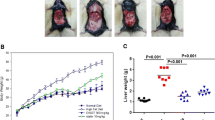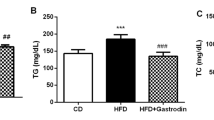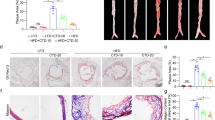Abstract
Elevated levels of plasma triglycerides (TG) and cholesterol have been shown to contribute to the pathogenesis of several cardiovascular risk factors, such as atherosclerosis, a primary cause of mortality. Gastrodin (Gas) is an effective polyphenol extracted from Chinese natural herbal Gastrodiae elata Blume, which has been documented to be effective against atherosclerosis. However, the related mechanisms remain largely unclear. The current investigation elucidated the involvement of Gas in the development of AS generated by a high-fat diet in mice lacking the apolipoprotein E gene (ApoE−/−). The findings of our study indicate that the administration of Gas had a beneficial effect on hyperlipidemia in mice that were given a high-fat diet and lacked the ApoE gene. Specifically, Gas supplementation resulted in a reduction in blood levels of oxidized low-density lipoprotein (ox-LDL), interleukin-6 (IL-6), monocyte chemoattractant protein-1 (MCP-1), and tumor necrosis factor-alpha (TNF-α). Additionally, the administration of Gas resulted in the suppression of lesions in the en face aortas of ApoE KO mice, accompanied by a modest improvement in lipid profiles. The intervention demonstrated the capacity to impede the development of atherosclerotic lesions and promote characteristics associated with plaque stability. The administration of Gas prevented inflammation in the aorta by decreasing the expression of IL-6, TNF-α, and MCP-1. Additionally, Gas had a mitigating effect on TLR4/NF‐κB pathway components in the aorta of ApoE−/− mice. Furthermore, it has been shown that Gas has the potential to mitigate the harm caused to human umbilical vein endothelial cells (HUVECs) by ox-LDL, perhaps via inhibiting inflammation through the TLR4/NF‐κB pathway. This study shows that Gas may potentially mitigate the development of atherosclerosis via its pleiotropic effects, including improvements in lipid profiles and anti-inflammatory properties.





Similar content being viewed by others
References
Wang, C., Niimi, M., Watanabe, T., Wang, Y., Liang, J., & Fan, J. (2018). Treatment of atherosclerosis by traditional Chinese medicine: questions and quandaries. Atherosclerosis, 277, 136–144.
Raggi, P., Genest, J., Giles, J., Rayner, K., Dwivedi, G., & Beanlands, R., et al. (2018). Role of inflammation in the pathogenesis of atherosclerosis and therapeutic interventions. Atherosclerosis, 276, 98–108.
Oliveira, H., & Vercesi, A. (2020). Mitochondrial bioenergetics and redox dysfunctions in hypercholesterolemia and atherosclerosis. Molecular Aspects of Medicine, 71, 100840.
Chen, X., Guo, X., Ge, Q., Zhao, Y., Mu, H., & Zhang, J. (2019). ER stress activates the NLRP3 inflammasome: a novel mechanism of atherosclerosis. Oxidative Medicine Cellular Longevity, 2019, 3462530.
Stachowicz, A., Olszanecki, R., & Suski, M., et al. (2014). Mitochondrial aldehyde dehydrogenase activation by Alda-1 inhibits atherosclerosis and attenuates hepatic steatosis in apolipoprotein E-knockout mice. Journal of the American Heart Association, 3(6), e001329–e001329.
Xiao, G., Tang, R., Yang, N., & Chen, Y. (2023). Review on pharmacological effects of gastrodin. Archives of Pharmacal Research, 46, 744–770.
Guo, Z., Yang, X., Wu, M., Shen, A., Li, J., & Zhang, X., et al. (2023). Gastrodin attenuates angiotensin II-induced vascular contraction and MLCK/p-MLC pathway activation. Pharmaceutical Biology, 61, 858–867.
Yang, C., Qiu, H., Lv, M., Yang, J., Wu, K., & Huang, J., et al. (2023). Gastrodin protects endothelial cells against high glucose-induced injury through up-regulation of PPARβ and alleviation of nitrative stress. Microvascular Research, 148, 104531.
Lu, J., Ma, X., Gao, W. C., Zhang, X., Fu, Y., Liu, Q., et al. (2021). Gastrodin exerts cardioprotective action via inhibition of insulin-like growth factor type 2/insulin-like growth factor type 2 receptor expression in cardiac hypertrophy. ACS Omega, 6, 16763–16774.
Fei, X., Cen, X., Zhao, R., Wang, J., & Cui, H. (2023). PRMT5 knockdown enhances cell viability and suppresses cell apoptosis, oxidative stress, inflammation and endothelial dysfunction in ox-LDL-induced vascular endothelial cells via interacting with PDCD4. International Immunopharmacology, 122, 110529.
Cheng, Q., Zhang, M., Zhang, M., Ning, L., Chen, D. (2020). Long non-coding RNA LOC285194 regulates vascular smooth muscle cell apoptosis in atherosclerosis. Bioengineered, 11, 53–60.
Livak, K. J., & Schmittgen, T. D. (2001). Analysis of relative gene expression data using real-time quantitative PCR and the 2−ΔΔCT method. Methods, 25, 402–408.
Chereshnev, I., Trogan, E., Omerhodzic, S., Itskovich, V., Aguinaldo, J. G., & Fayad, Z. A., et al. (2003). Mouse model of heterotopic aortic arch transplantation. The Journal of Surgical Research, 111, 171–176.
Xiang, Q., Tian, F., Xu, J., Du, X., Zhang, S., Liu, L. (2022) New insight into dyslipidemia-induced cellular senescence in atherosclerosis. Biological Reviews of the Cambridge Philosophical Society, 97, 1844–1867.
Ye, T., Meng, X., Wang, R., Zhang, C., He, S. (2018) Gastrodin alleviates cognitive dysfunction and depressive-like behaviors by inhibiting ER stress and NLRP3 inflammasome activation in db/db mice. International Journal of Molecular Sciences, 19, 3977.
Ridker, P. M., & Lüscher, T. F. (2014). Anti-inflammatory therapies for cardiovascular disease. European Heart Journal, 35, 1782–1791.
Moghimpour Bijani, F., Vallejo, J. G., & Rezaei, N. (2012). Toll-like receptor signaling pathways in cardiovascular diseases: challenges and opportunities. International Reviews of Immunology, 31, 379–395.
Zhang, K., Qin, X., Qiu, J., Sun, T., Qu, K., & Din, A. U., et al. (2023). Desulfovibrio desulfuricans aggravates atherosclerosis by enhancing intestinal permeability and endothelial TLR4/NF-κB pathway in Apoe (−/−) mice. Genes & Diseases., 10, 239–253.
Li, Y., Zhang, L., Ren, P., Yang, Y., Li, S., & Qin, X., et al. (2021). Qing-Xue-Xiao-Zhi formula attenuates atherosclerosis by inhibiting macrophage lipid accumulation and inflammatory response via TLR4/MyD88/NF-κB pathway regulation. Phytomedicine International Journal of Phytotherapy and Phytopharmacology, 93, 153812.
Meng, D., Deng, X., Wu, Y., Wu, J., Zhang, Y., & Zhang, J., et al. (2023). Corilagin ameliorates macrophages inflammation in atherosclerosis through TLR4-NFκB/MAPK pathway. Heliyon, 9, e16960.
Cole, J. E., Kassiteridi, C., & Monaco, C. (2013). Toll-like receptors in atherosclerosis: a ‘Pandora’s box’ of advances and controversies. Trends in Pharmacological Sciences, 34, 629–636.
Author Contributions
Research idea and study design: B.D. and S.Y.; data acquisition: B.D. and C.L.; data analysis/interpretation: S.Z. and C.L.; statistical analysis: B.D. and M.H. administrative support: S.Y.; All authors read and approved the final manuscript.
Author information
Authors and Affiliations
Corresponding author
Ethics declarations
Conflict of Interest
The authors declare no competing interests.
Ethics Approval and Consent to Participate
Our animal experiment was approved by the Animal Ethics Committee of Tianjin University Tianjin Hospital.
Additional information
Publisher’s note Springer Nature remains neutral with regard to jurisdictional claims in published maps and institutional affiliations.
Supplementary Information
Rights and permissions
Springer Nature or its licensor (e.g. a society or other partner) holds exclusive rights to this article under a publishing agreement with the author(s) or other rightsholder(s); author self-archiving of the accepted manuscript version of this article is solely governed by the terms of such publishing agreement and applicable law.
About this article
Cite this article
Dai, B., Liu, C., Zhang, S. et al. Gastrodin Suppresses the Progression of Atherosclerosis and Vascular Inflammation by Regulating TLR4/NF‐κB Pathway. Cell Biochem Biophys (2024). https://doi.org/10.1007/s12013-024-01218-8
Received:
Accepted:
Published:
DOI: https://doi.org/10.1007/s12013-024-01218-8




